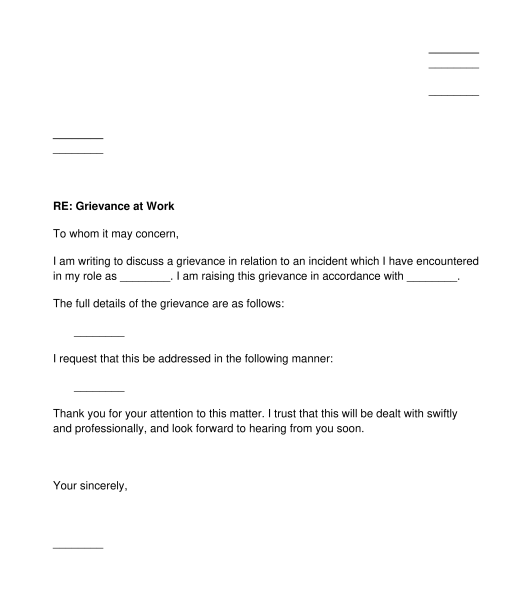 15/01/2025
15/01/2025

Answer a few questions and your document is created automatically.

Your document is ready! You will receive it in Word and PDF formats. You will be able to modify it.

 15/01/2025
15/01/2025
 Word and PDF
Word and PDF
 1 page
1 page
This document can be used to raise a grievance or a complaint at work. It acts as a signed letter confirming a formal grievance has been raised, and is provided by the employee to the employer.
The document can be tailored to describe the nature of the grievance, such as the date of any incidents which took place and the people involved. The rationale for why these incidents constitute a grievance can also be detailed in the document.
The document may be used for a wide range of grievances or complaints. This might include things such as bullying, discrimination, harassment, dangerous or unpleasant work conditions, complaints about a coworker, complaints about some kind of injury or damage to personal property, or any other kind of grievance regarding the employee's work conditions.
If the employee's grievance relates to their pay, and they are asking for a pay rise, then our Raise Request Letter might be more appropriate.
How to use this document
The document should be signed and dated by the person raising a grievance and provided to the appropriate individual within the employee's organisation who will be responsible for investigating the incidents, such as the HR Director. The person raising the grievance may wish to keep a copy of the document for their own records.
Applicable law
The Fair Work Act 2009 (Commonwealth) and the National Employment Standards (NES) apply to many employment situations in Australia.
Many employment situations are also governed by modern awards or enterprise agreements. If such an award or agreement applies, then that will set out some additional minimum standards with which the employer must comply.
In relation to bullying, harassment, victimisation and discrimination, the following legislation might be relevant:
- Australian Human Rights Commission Act 1986 (Commonwealth)
- Racial Discrimination Act 1975 (Commonwealth)
- Disability Discrimination Act 1992 (Commonwealth)
- Age Discrimination Act 2004 (Commonwealth)
- Sex Discrimination Act 1984 (Commonwealth)
Each state and territory has legislation in relation to work health and safety. Further information is available from Safe Work Australia.
In addition, general principles of contract law, as provided by the common law, will apply to any employment contract.
How to modify the template
You fill out a form. The document is created before your eyes as you respond to the questions.
At the end, you receive it in Word and PDF formats. You can modify it and reuse it.
A guide to help you: How to Send a Letter
Employment Grievance Letter - sample template
Country: Australia